A Way of Being Free Read online
Page 8
The writer breaks cover; the writer cries out at what the oil companies are doing to the earth, the destruction of the land; the writer cries out at the injustices that run over and now spill out in floods across the streets and byways; the writer wails words of blood at the death of democracy, the beginning of fragmentation and civil war; the writer sometimes even abandons the pen out of monumental frustration, and takes other routes to warn and draw attention to what can no longer be accepted – they become activists, they become soldiers, or they take to politics as an extension of their loving rage.
For, essentially, it is love that we are talking about here; love for the better life that could be real for all the people; love for the greater possibilities of the future that are being murdered in the present by short-sighted leaders; love for the greater way, a higher justice that sits in the land like a wise and invisible god; love for better breathing in the beggar and the basket-weaver; love for women who bear all the suffering and wend their ways to deserted marketplaces and who create such small miracles of survival out of the bitter dust of the dying age; love for the children who grow up under a generous sun and who do not know just how distorted and blood-ridden are the futures they will inherit, who play in the streets and at their games while poison and despair gather about them and hover over their heads like the angels of death; love for the regeneration of a people who deserve so much better and who never seem to get any justice or many good days or much hope on this round earth which glows like a miraculous dream in space to the astonished gaze of astronauts.
It is love for mankind’s better future, desire that we may all be better, that our mistakes be higher ones and that the lowest level in living conditions be at least one which is adequate; it is love that drives the seed into becoming the future tree; it is love that makes people extend their hands across seas, across race, across creeds, forging links that make the human dream grow into splendid human realities; it is love that drives the mother to protect the child against suffering; it is love that makes the writer weep when a bloodtide announces itself just over the horizon.
And when this love has been sentenced to death, then those who have hearts that beat with blood, those with flesh that feels the wind and the caress of a lover and life’s infinitely graded sufferings, anyone who feels life within should hear this cry – writers are being sentenced to death, sentenced for trying to draw attention to what is being done to the land in the name of profit, and executed for trying to remind a nation, in their own way, of something that should be an acknowledged law that governs the rise and fall of nations and peoples: what does not grow, dies; what does not face its truth, perishes; those without vision deserve the destruction that will fall upon them; those who believe that they can suppress freedom and yet live in freedom are hopelessly deluded. Either a nation faces its uncomfortable truths, or it is overwhelmed by them; for there is a prophetic consequence in the perpetuation of lies, just as there is an unavoidable fate for all those who refuse to see.
There are some things on earth that are stronger than death. One of these is the eternal human quest for justice; a people cannot live without it, and in due course they will be prepared to die to make it possible for their children.
Fables are made of this.
The Joys of Storytelling III
Aphorisms and Fragments
1
To poison a nation, poison its stories. A demoralised nation tells demoralised stories to itself. Beware of the storytellers who are not fully conscious of the importance of their gifts, and who are irresponsible in the application of their art: they could unwittingly help along the psychic destruction of their people.
2
The parables of Jesus are more powerful and persuasive than his miracles.
3
Stories are as ubiquitous as water or air, and as essential. There is not a single person who is not touched by the silent presence of stories.
4
A people are as healthy and confident as the stories they tell themselves. Sick storytellers can make their nations sick. And sick nations make for sick storytellers.
5
Great leaders understand the power of the stories they project to their people. They understand that stories can change an age, turn an era round.
6
Great eras are eras in which great stories are lived and told.
7
Great leaders tell their nations fictions that alter their perceptions. Napoleon exemplified this, and made himself into an enthralling story. Even bad leaders know the power of negative stories.
8
All the great religions, all the great prophets, found it necessary to spread their message through stories, fables, parables. The Bible is one of the world’s greatest fountains of fiction and dream.
9
The miracles of Jesus came down to us as stories, magical stories. It is the stories, rather than the facts, which still enchant us towards belief.
10
Alexander the Great conquered all of the known world. But Alexander himself was gently conquered by Homer.
11
Without fighting, stories have won over more people than all the great wars put together.
12
The greatest religions convert the world through stories.
13
A great challenge for our age, and future ages: to do for storytelling what Joyce did for language – to take it to the highest levels of enchantment and magic; to impact into story infinite richness and convergences; to make story flow with serenity, with eternity.
14
Stories are the secret reservoir of values: change the stories individuals or nations live by and tell themselves, and you change the individuals and nations.
15
Nations and peoples are largely the stories they feed themselves. If they tell themselves stories that are lies, they will suffer the future consequences of those lies. If they tell themselves stories that face their own truths, they will free their histories for future flowerings.
16
There is a natural justice to the incontrovertible logic of the way stories reveal their hidden selves.
17
Stories are either dangerous or liberating because they are a kind of destiny.
18
The fact of storytelling hints at a fundamental human unease, hints at human imperfection. Where there is perfection there is no story to tell.
19
In the beginning there were no stories.
20
That previous fragment is a story.
21
The universe began as a story.
22
When we have made an experience or a chaos into a story we have transformed it, made sense of it, transmuted experience, domesticated the chaos.
23
When we started telling stories we gave our lives a new dimension: the dimension of meaning – apprehension – comprehension.
24
Only those who have lived, suffered, thought deeply, loved profoundly, known joy and the tragic penumbra of things tell truly wonderful stories.
25
Stories do not belong to eternity. They belong to time. And out of time they grow. And it is through lives that touch the bedrock of suffering and the fire of the soul, it is through lives, and in time, that stories – relived and redreamed – become timeless.
26
The greatest stories are those that resonate our beginnings and intuit our endings (our mysterious origins and our numinous destinies), and dissolve them both into one.
27
Homo fabula: we are storytelling beings.
28
We are part human, part stories.
29
It is through the fictions and stories we tell ourselves and others that we live the life, hide from it, harmonise it, canalise it, have a relationship with it, shape it, accept it, are broken by it, redeem it, or flow with the life.
30
&nbs
p; Without stories we would go mad. Life would lose its moorings or lose its orientations. Even in silence we are living out stories.
31
Stories can drive you mad.
32
Stories can heal profound sicknesses of the spirit.
33
It is through their stories that the ancient Greeks so profoundly influence and shape the world. Prometheus, Ixion, Sisyphus, Perseus, the Gorgon’s head, Calypso, Odysseus – their stories are eternal metaphors of the partially revealed nature of the human condition.
34
Africa breathes stories.
35
In Africa everything is a story, everything is a repository of stories. Spiders, the wind, a leaf, a tree, the moon, silence, a glance, a mysterious old man, an owl at midnight, a sign, a white stone on a branch, a single yellow bird of omen, an inexplicable death, an unprompted laughter, an egg by the river, are all impregnated with stories. In Africa things are stories, they store stories, and they yield stories at the right moment of dreaming, when we are open to the secret side of objects and moods.
36
Africa is a land bristling with too many stories and moods. This over-abundance of stories, this pollulation, is a sort of chaos. A land of too many stories is a land that doesn’t necessarily learn from its stories. It should trade some of its stories for clarity. Stories hint both at failure and celebration. Dying lands breed stories in the air like corpses breed worms. A land beginning to define itself, to create beauty and order from its own chaos, moves from having too many moods and stories in the air to having clear structures, silences, clear music, muted and measured celebrations, lucid breezes, freed breathing, tentative joys, the limpid freshness of new dawns over places sighted across the sea for the first time. If suffering breeds stories, then the transformation of suffering into a higher order and beauty and functionality breathes tranquillity.
37
Tranquillity is the resolution of the tensions and paradoxes of story into something beyond story: into stillness.
38
Unhappy lands prefer Utopian stories.
Happy lands prefer unhappy stories.
39
The stories of the Egyptians and the Greeks, rather than their poems, shaped the world’s consciousness and named the stars.
40
For Africans the world is imbued with stories, legends, tales.
41
The African mind is essentially abstract, and their storytelling is essentially philosophical.
42
The happiness of Africa is in its nostalgia for the future, and its dreams of a golden age.
43
In Africa the mood in its music is a poignant golden story of everlasting hope and prayer.
44
Where stories are, struggles have been lived through, fates have been lived out, triumphs have danced with failures, and human destinies have left their imprints and their souls and their stories on the land, in the air, and even on the waters. Strangers to these lands can feel the vibrations of the people’s forgotten histories and fates in the air.
45
Moods are stories unspoken, condensed in the air, untold. Stories become moods, and are moods unfurled, allowed to grow.
46
The transparency of excellent stories: words dissolve words, and only things stand in their place.
47
In bad stories words cancel themselves out, and nothing is left. The words return to their source; they desert the page; only meaningless marks are left behind.
48
Story is paradox.
49
The superiority of one writer over another is not just in the quality of language; but also in the quality of the story and the storytelling; the quality of enchantment; and the timelessness of that enchantment. It is therefore futile to speak of superiorities. There is only that which lives, and which keeps on living.
50
Creating the smallest living thing, creating life, no matter how small, is greater than creating a vast dead planet. A thing that lives is a universe.
51
It is in the creation of story, the lifting of story into the realms of art, it is in this that the higher realms of creativity reside.
52
A good story keeps on growing. A good story never dies.
53
Stories are the wisest surviving parts of a people’s stupidities or failings.
54
A people without stories would be a perfected people or a forgetful people, or an insane people – which is to say that they are a mythical people, or have ceased to exist, or are on their way to doing so.
55
Stories can destroy civilisations, can win wars, can lose them, can conquer hearts by the millions, can transform enemies into friends, can help the sick towards healing, can sow the seeds of the creation of empires, can undo them, can reshape the psychic mould of a people, can remould the political and spiritual temper of an age.
56
Stories can be either bacteria or light: they can infect a system, or illuminate a world.
57
Like water, stories are much taken for granted. They are seemingly ordinary and neutral, but are one of humanity’s most powerful weapons for good or evil.
58
It is easy to forget how mysterious and mighty stories are. They do their work in silence, invisibly. They work with all the internal materials of the mind and self. They become part of you while changing you. Beware the stories you read or tell: subtly, at night, beneath the waters of consciousness, they are altering your world.
59
Stories are one of the highest and most invisible forms of human creativity.
60
Stories are always a form of resistance.
61
There is a perpetual creativity involved in storytelling. Stories make people more creative, negatively or positively.
62
The writing of stories: the hidden frame, the hidden harmony.
63
The miracle of stories, and the mystery.
64
The storytelling quality in Mozart’s music. How certain bars, certain notes in the Piano Concerto 27 hint at a story that goes something like this: ‘One day, when I was happy, a nightingale flew past my window, and the love of my life left me for another.’
65
Music and stories: the notes that haunt us because they have become the moods of our joys and our sweet sadnesses for ever.
66
The grief of Orpheus is a story told with anguish over and over again, every day, for seven years, and told in all its agonising internal permutations.
67
Orpheus’s grief is the mother of music, but is itself born of story, a story unbearable to live, obsessive to tell – the story of our inescapable loss, and the measure of our love.
68
The infinite interpretability of great stories – and their serenity.
69
To see the madness and yet walk a perfect silver line.
70
The greatest guide is the clearest spirit and mind.
71
That’s what the true storyteller should be: a great guide, a clear mind, who can walk a silver line in hell or madness. Dante chose Virgil. I would choose Jesus, or the Buddha, or Lao Tsu, or Homer.
72
Great storytellers seldom found religions. Great founders of religions are always excellent storytellers.
73
Only a profound storyteller would say something like: ‘Suffer the little children to come unto me.’
74
The great essays on storytelling are done in stories themselves.
75
The true storyteller suffers the chaos and the madness, the nightmare – resolves it all, sees clearly, and guides you surely through the fragmentation and the shifting world.
76
I am not referring to just any story,
but only to those great ones, rich and rare, that haunt, that elude, that tantalise, that have the effect of poignant melodies lodged deep in barely reachable places of the spirit. The human race is not blessed with many stories of this quality.
77
The magician and the evangelist have much in common: both have to distract (our attention).
78
The magician and the politician also have much in common: they both have to draw our attention away from what they are really doing.
79
Magic distracts our attention from the hidden methods, art draws our attention to the hidden revelation.
80
Magic becomes art when it has nothing to hide.
81
The higher the artist, the fewer the gestures.
82
The fewer the tools, the greater the imagination.
83
The greater the will, the greater the secret failure.
84
It is precisely in a broken age that we need mystery and a reawakened sense of wonder: need them in order to be whole again.
85
Philosophy is most powerful when it resolves into story. But story is amplified in power by the presence of philosophy.
86
The infinite life of a beautiful story.
87
Creativity is a secular infinity.
88
Creativity is evidence of the transhuman.
89
Creativity is the highest civilising faculty.
90
Love is the greatest creativity of them all, and the most blessed.
91
Creativity of any valuable kind is one of the fullest expressions of the human and the godlike within us.
92
The greatest joy is that of love – loving life, loving others, loving yourself, loving your work. The next greatest joy is the freedom to serve.
93
Creativity is love, a very high kind of love.
94
The imagination is one of the highest gifts we have.
95
To find life in myth, and myth in life.
96
Maybe there are only three kinds of stories: the stories we live, the stories we tell, and the higher stories that help our souls fly up towards the greater light.

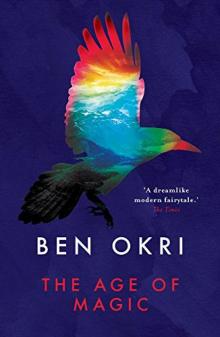 The Age of Magic
The Age of Magic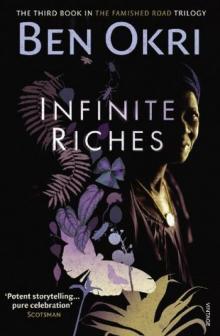 Infinite Riches
Infinite Riches Songs of Enchantment
Songs of Enchantment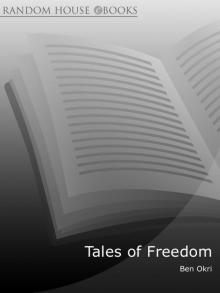 Tales of Freedom
Tales of Freedom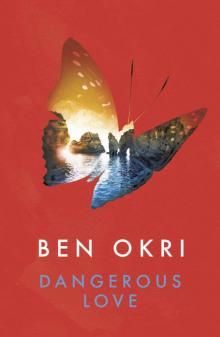 Dangerous Love
Dangerous Love Starbook
Starbook The Famished Road
The Famished Road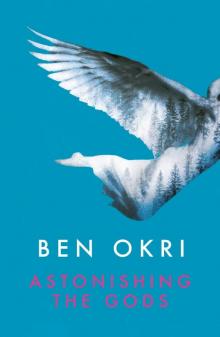 Astonishing the Gods
Astonishing the Gods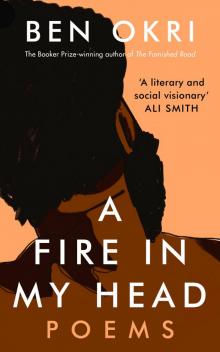 A Fire in My Head
A Fire in My Head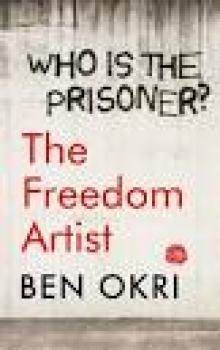 The Freedom Artist
The Freedom Artist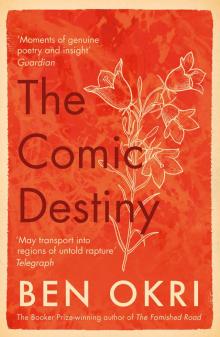 The Comic Destiny
The Comic Destiny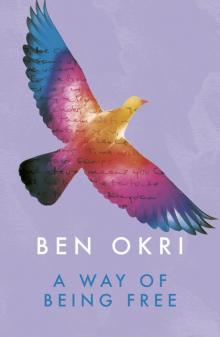 A Way of Being Free
A Way of Being Free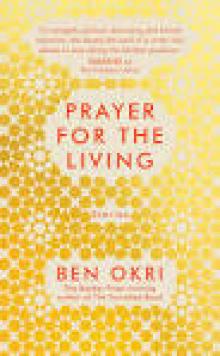 Prayer for the Living
Prayer for the Living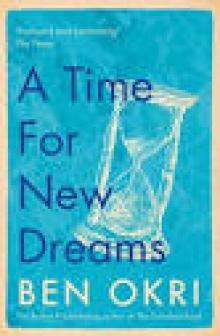 A Time for New Dreams
A Time for New Dreams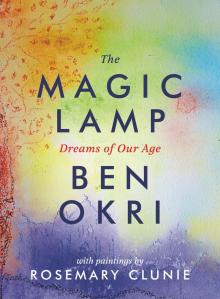 The Magic Lamp
The Magic Lamp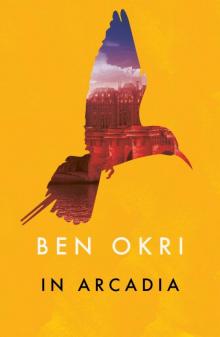 In Arcadia
In Arcadia